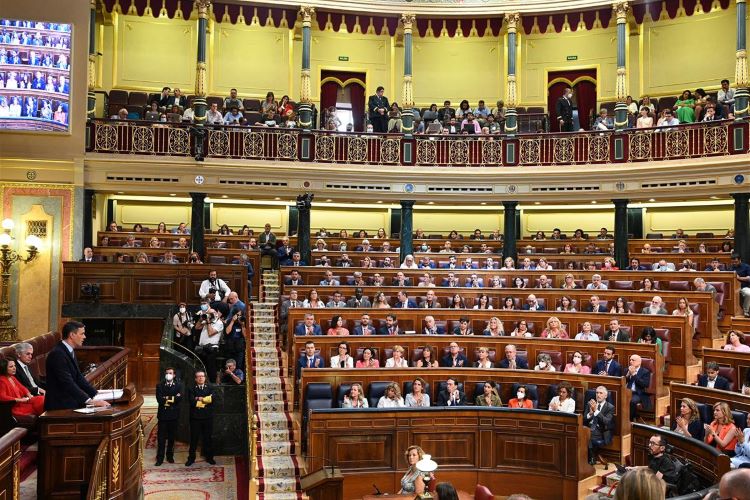Eduardo González
The Congress approved yesterday, at the end of the Debate on the State of the Nation, a motion of resolution of the PP agreed with the PSOE to promote the increase of the Defense budget to 2% of GDP, in line with what was decided during the recent NATO Summit in Madrid.
The proposed resolution “on Foreign and Defense Policy” was approved with 222 votes in favor, 68 against (including the seats of Unidas Podemos, a minority partner of the Government) and 55 abstentions. The text is not binding, like the other 41 resolutions approved yesterday, but it is quite important from a “symbolic” point of view.
In one of the points of the resolution, the PP urges the Government to strengthen the relationship with the United States, to “support the expansion of the military contingent requested for the Rota base” and to “promote in all its dimensions the new strategic concept approved at the NATO Summit”.
During their bilateral meeting last June 28 in Madrid, on the eve of the NATO Summit, the President of the Government, Pedro Sánchez, and the President of the United States, Joe Biden, signed a Joint Declaration in which it was agreed, among other things, to increase the number of US warships in Rota. The U.S. National Security Advisor, Jake Sullivande, informed reporters hours earlier that the intention of the United States is to send two more destroyers to the base in Rota, which will go from “four to six destroyers”. The agreement with the United States generated a new political storm within the coalition government, after the PP announced its support to the measure and Unidas Podemos formally announced its intention to vote against it in Congress.
Likewise, the text approved yesterday includes an amendment proposed by the PSOE in which the Government is urged to promote “a scenario of Defense budget increase that allows achieving the objective of 2% of the GDP set in the Wales Summit of 2014”. In order to reach the agreement with the Socialists, the PP agreed to withdraw from its proposal the approval of “a national Defense financing law with a multiannual programming that allows reaching the objective of an investment of up to 2% of the GDP”.
This is not the first time that the Congress approves a text in this sense, since last March 22 the Defense Committee asked the Government -at the proposal of the PP and with the abstention of Unida Podemos- to increase “in a progressive way” the budget expenditure in Defense until reaching two percent of the GDP. On that occasion, the PP also refused to “set clear deadlines” in order to reach a consensus with the PSOE.
Last June 30, Pedro Sánchez announced at the end of the NATO Summit in Madrid his intention to put before the Spanish Parliament a “country agreement” to reach 2% in defense spending in 2029 (therefore, five years after the 2024 date established at the NATO Summit in 2014). Following the announcement, the president of the PP, Alberto Núñez Feijóo, assured that his party would support the increase in the military budget, while, in a very different sense, Unidas Podemos rejected outright the increase in military spending. At the beginning of this month, the second vice-president of the Government, Yolanda Díaz, asked the PSOE for an urgent meeting of the monitoring commission of the coalition pact in view of the differences on the increase of the military expenditure and the “concern” that, in the midst of inflation, the items for Defense reach 22,000 million Euros.
Last Tuesday, during the first day of the Debate on the State of the Nation, Pedro Sánchez assured, in response to the parliamentary spokesman of Unidas Podemos, Pablo Echenique, and to the president of the confederal group, Jaume Asens, that there is no incompatibility between increasing military spending and increasing social spending because “we can do both things and it is also our duty to do so”.
Other points of the resolution
On the other hand, the resolution urges the Government to promote a foreign and security policy “of State”, in which “the permanent axes that have been common to all the governments of democracy in matters of neighborhood, EU and Latin America” are recovered and strengthened, and to “promote a foreign policy in Latin America based on the strengthening of the rule of law, democracy and the separation of powers”.
The text also calls for priority to be given in the next Master Plan to “international cooperation with the countries of origin of irregular immigration” and to promote “the role of Spain in the EU” through an “ambitious agenda on the occasion of the Spanish Presidency of the Union that includes, among other measures, the strengthening of the rule of law with the reform of the Euro-order, the adaptation of the internal procedures of the Commission to speed up the incorporation of Ukraine into the EU and the full development of a common security and defense policy”. The resolution also defends the development of the Strategic Compass, “promoting Spanish participation in the creation and implementation of the new EU Rapid Deployment Capability”.






